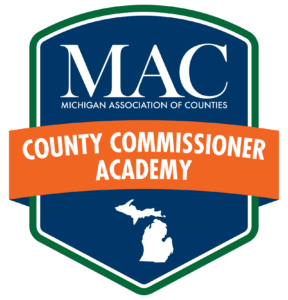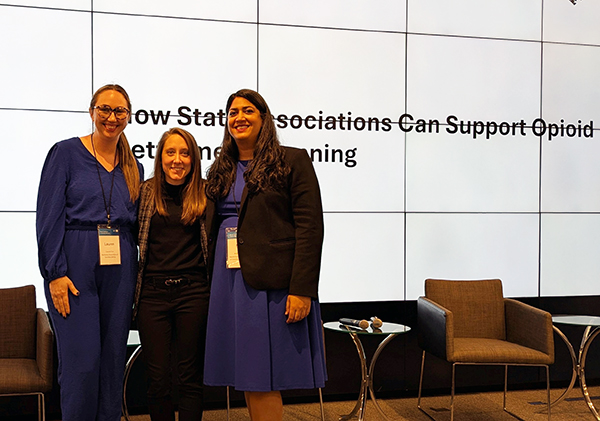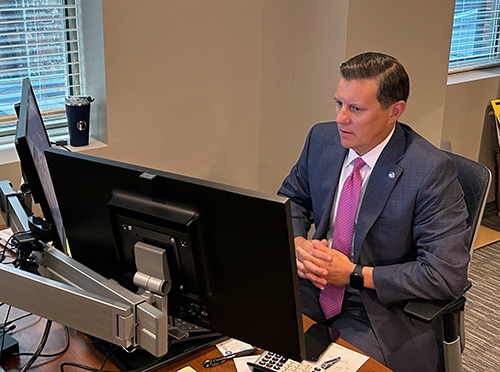Senate advances budget bills in uncertain, tense atmosphere in Lansing
 The Michigan Senate took a major step in the state’s annual budget process, advancing all its fiscal 2026 budget bills out of the Senate Appropriations Committee. This action moves the upper chamber closer to a full floor vote expected next week.
The Michigan Senate took a major step in the state’s annual budget process, advancing all its fiscal 2026 budget bills out of the Senate Appropriations Committee. This action moves the upper chamber closer to a full floor vote expected next week.
However, with the Michigan House of Representatives yet to begin its own movement on the budget, the state’s path to a finalized spending plan remains fraught with uncertainty and political friction.
The House, controlled by Republicans, has opted to wait until after the Consensus Revenue Estimating Conference on May 16 before making any recommendations. This biannual meeting of state fiscal experts will provide updated projections on state revenues, a key metric in determining how much money lawmakers will have to work with. This cautious approach reflects growing concerns over potential cutbacks in federal support, particularly for Medicaid and other funding streams that form the backbone of the state budget.
Despite a statutory deadline of July 1 to enact a budget, Michigan faces no immediate penalties for failing to meet it. However, with the fiscal year beginning on Oct. 1, 2025, the stakes grow higher as the year progresses. Without an approved budget by that date, the state could face a government shutdown.
Tensions are also rising between the two legislative chambers, where a split government has produced significant roadblocks. The Democratic Senate and GOP House do not currently share aligned budget priorities, and formal negotiations have not yet begun. Many expect those talks to stretch into the summer months.
Earlier this year, the House passed a limited budget bill aimed at funding essential services, such as the Department of Corrections, revenue sharing and education, for FY26. However, the Senate dismissed the proposal, and no further action has been taken on that bill.
Complicating matters further is an ongoing dispute between the chambers. The House has declined to consider Senate bills until the Senate drops a lawsuit against House Speaker Matt Hall. The lawsuit stems from Hall’s refusal to transmit nine Senate-approved bills from the last session to Gov. Gretchen Whitmer, a move Senate Democrats argue is unconstitutional.
Amid this, the Senate is continuing to lay out its fiscal priorities. The most notable new funding item in the proposed FY 2026 budget is a $372 million allocation for a Community Infrastructure Fund. The money, sourced from the state’s General Fund, supports a $29 million boost to county revenue sharing. These funds will be distributed based on a taxable value formula first adopted in the FY25 budget.
The Senate also has included $60 million for a new Community Crime Reduction Initiative. This funding model departs from traditional public safety appropriations, giving counties more flexibility in tackling crime. The funds can be used to support local police, prosecutors, mental health services and other crime-reduction efforts.
Click here to see Senate spending bill texts.
As the Senate prepares to pass its full budget package, all eyes will be on the House to see how it responds.
For more information on this issue, contact Deena Bosworth at bosworth@micounties.org.
Registration opens for CCA webinar on ‘Conflict Styles & Constructive Dialogues’
 A webinar offered on June 23 from 12 p.m. to 1 p.m. will provide commissioners a full credit toward their 2025 certificate in MAC’s County Commissioner Academy.
A webinar offered on June 23 from 12 p.m. to 1 p.m. will provide commissioners a full credit toward their 2025 certificate in MAC’s County Commissioner Academy.
Conflict is an inevitable part of leadership and community work — but how we approach it can mean the difference between division and meaningful progress. In this interactive one-hour session, we’ll explore practical tools for identifying your own conflict style, navigating challenging personalities, and reframing tough conversations into opportunities for collaboration. You’ll also learn how Convergence’s nationally recognized Collaborative Problem-Solving process can be used to bridge divides, build trust, and create understanding across differences in your public meetings.
The session will be facilitated by Mariah Levison, President & CEO of Convergence Center for Policy Resolution, and Gabriel Herrera, Director of Programs. Mariah brings more than 15 years of experience in dialogue, mediation, and public engagement, with a deep focus on helping groups in conflict find common ground. Gabriel is a dialogue facilitator with nearly a decade of experience in conflict coaching, mediation, and collaborative problem-solving – bringing diverse voices together to navigate complex challenges.
Podcast 83: Aid bill filed to address veteran grant shortfall for coming year
Legislation to address a coming shortfall in county veteran service efforts was a focus of this week’s episode of Podcast 83, whose ranks were expanded with the return of a familiar face.
“The Veterans Service Grant Fund has a shortfall of roughly $3.7 million,” noted Jimmy Johnson, governmental affairs specialist. “The veterans affairs department has really been taking a lot of heat on this. And this is not a partisan issue. This has been bipartisan. And luckily, we have a very great champion in the House, Rep. Julie Rogers, who introduced House Bill 4423.
“This is an appropriation from the General Fund for $3.7 million. … We are really feeling good about the chances of this hurrying up and passing with broad, bipartisan support. … And what makes me feel really good about this is that the chair of (the key) committee is also one of the sponsors on it.”
Rejoining the Podcast 83 team is Samantha Gibson, who has returned to MAC in the role of governmental affairs specialist after assisting with the recent transition in Washington, D.C.
“I am so excited to be back at MAC,” Gibson said. “I missed this office and all of our commissioners very much. So, I went to D.C. for a little bit, but I’m a Michigan girl at heart, so I had to come back. I’m just elated to be back with the counties.”
For details on the new shape of responsibilities among MAC’s governmental affairs team and other details, view the full episode, recorded on May 5, by clicking here or on the image above.
MAC in action
|
MAC’s Amy Dolinky was in Washington, D.C., last week as part of a NACo gathering on opioid settlement planning. Here she is shown with Lauren Carr, opioid settlement adviser, Kentucky Association of Counties (left), and Nidhi Sachdeva, director of strategic health and opioid initiatives, North Carolina Association of County Commissioners. |
|
MAC Executive Director Stephan Currie spoke with WILX-TV in Lansing via Zoom on Wednesday about challenges faced by counties in finding revenues to provide services that the public expects. |
Gibson rejoins MAC in governmental affairs role
 Samantha Gibson, who began as an intern at MAC, has returned to the association’s staff as a governmental affairs specialist after a brief stint in Washington, D.C.
Samantha Gibson, who began as an intern at MAC, has returned to the association’s staff as a governmental affairs specialist after a brief stint in Washington, D.C.
Gibson first joined MAC full-time in August 2022 as a governmental affairs associate. Prior to that, she served as a constituent relations liaison and legislative director in the Michigan House of Representatives. She holds a B.A. in political science from Michigan State University.
“We are thrilled to have Sam back on the team,” said Deena Bosworth, director of governmental affairs. “Her extensive experience in the Legislature and on county issues allow her to hit the ground running, which is especially important as we are in the middle of a contentious legislative year in Lansing.”
Gibson will be the point person on MAC’s advocacy work in the areas of courts, public safety, infrastructure and general government (including labor matters, election law, the Open Meetings Act, the Freedom of Information Act and statute of limitations issues).
Gibson will also lead a rebrand of MAC’s political action committee, now known as MACPAC, to “CountiesUnited,” which will include a variety of donor benefits designed to foster closer relationships between county commissioners and state legislators.
Gibson can be reached at gibson@micounties.org or 517-372-5375.
MAC congratulates recent MI grads from NACo Leadership Academy
 Nine county public servants were among the most recent graduating class of the NACo Leadership Academy, the 12-week, online leadership program founded by General Colin Powell:
Nine county public servants were among the most recent graduating class of the NACo Leadership Academy, the 12-week, online leadership program founded by General Colin Powell:
- Trisha Baumgartner, senior IT engineer, Midland County
- Andrew Klaczkiewicz, IT director, Saginaw County
- Mary McLaughlin, community corrections manager, Saginaw County
- Nathan Miller, GIS coordinator, Midland County
- Crystal Richardson, chief of staff, Macomb County
- Bill Stanuszek, director, Saginaw County
- Molly Strohm, human resources & risk manager, Marquette County
- Lena Vander Meulen, director, Leelanau County
- Barbara Winter, policy & fiscal analysis supervisor, Oakland County
Enroll now for August 2025!
Join over 10,000 county leaders already benefiting from the effectiveness of this program. The August cohorts are right around the corner. Join us in investing in the workforce – empowering them to become better leaders today and into the future.
The online program helps your workforce develop fundamental, practical leadership skills to deliver results for counties and our residents.
For more details, visit the HPLA section on the MAC website.
Internal controls are focus of May 19 webinar from Treasury, MSUE
 The Michigan Department of Treasury and Michigan State University Extension (MSUE) will host their next Fiscally Ready Communities training opportunity on May 19. This FREE training is a 90-minute webinar that’s designed to assist appointed and elected officials with entry and intermediate level budgeting knowledge.
The Michigan Department of Treasury and Michigan State University Extension (MSUE) will host their next Fiscally Ready Communities training opportunity on May 19. This FREE training is a 90-minute webinar that’s designed to assist appointed and elected officials with entry and intermediate level budgeting knowledge.
This training will include a deep dive into internal controls. It will cover what internal controls are, why you need them, how they help your community, how to implement them, and where to start.
What will be covered:
- Building a culture of fiscal sustainability
- The role of internal controls in fiscal sustainability
- Understanding internal controls and their importance
- How internal controls help strengthen your community
- Best practices for internal controls implementation
Date/Time: May 19, 2025, 2 p.m. to 3:30 p.m. Eastern
For more information about Fiscally Ready Communities, please check out the Treasury Fiscally Ready Communities webpage. This webpage includes Treasury’s 32-page Fiscally Ready Communities Best Practices document, which we encourage all local officials to review.
If you have any questions, please email TreasLocalGov@michigan.gov with the subject line “Fiscally Ready.”
 Staff picks
Staff picks
- Wisconsin’s construction training program could serve as national model (Governing)
- These are the 10 fastest growing counties in the U.S. (American City and County)
- Fiscal Snapshot: Budget Stabilization Fund (Michigan House Fiscal Agency)
- Speedboat that flipped midair in 200 mph crash wins race on Arizona lake (Associated Press)


